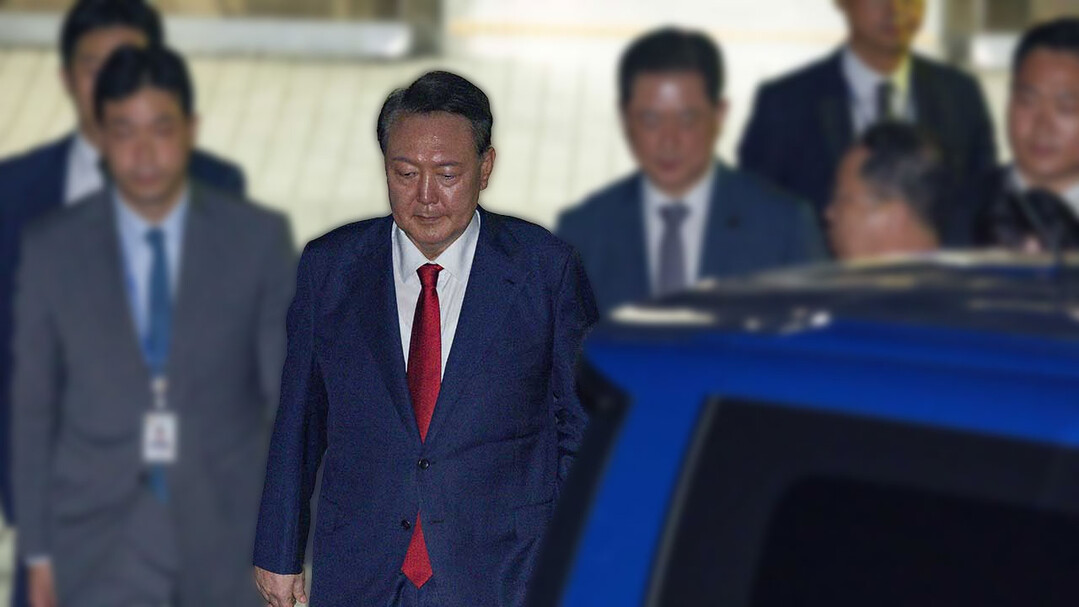
The court has rejected former President Yoon Suk-yeol's request for a review of the legality of his detention, reconfirming the legitimacy of his arrest. Consequently, the Rebellion Special Prosecutor Team (hereinafter referred to as the Special Prosecutor) is accelerating its comprehensive investigation into former President Yoon, including charges of foreign affairs offenses such as the operation to deploy unmanned aerial vehicles in Pyongyang. They are also seriously considering indicting him immediately without extending his detention period.
The Seoul Central District Court Criminal Appeals Division 9-2 (Presiding Judge Ryu Chang-sung) dismissed former President Yoon's request this afternoon (the 18th) after reviewing the legality of his detention. The court stated, "Based on the results of the suspect's interrogation and the records of this case, this request is deemed to be without merit," explaining the reason for the dismissal. This decision is in accordance with Article 214-2, Paragraph 4 of the Criminal Procedure Act, which allows the court to interrogate the suspect and examine investigative documents and evidence within 48 hours of receiving the request, and then dismiss the request if it is deemed without merit.
The court appears to have determined that there is a high likelihood that former President Yoon's criminal charges will be established, and there is a risk of evidence destruction and coercion or pressure on case-related individuals if he is released. Former President Yoon's side argued vehemently, using 140 PowerPoint (PPT) slides, that the charges claimed by the Special Prosecutor were not substantiated and that there was no risk of evidence destruction, but the court did not accept this. In contrast, the Special Prosecutor's team, including Special Prosecutor Assistant Park Eok-soo and five other prosecutors, strongly asserted the necessity of detention through approximately 100 PPT slides and written opinions.
The court also ruled that former President Yoon's emphasized health issues could not be a reason for release. It was reported that in the interrogation, former President Yoon pleaded, "My liver enzyme levels have soared to five times the normal range," and "I'm suffering from severe dizziness and insomnia, making it difficult even to walk to court." However, the court sided with the Special Prosecutor, ruling that his detention should be maintained, considering that he had been uncooperative with the Special Prosecutor's summons for questioning and the criminal trial for rebellion ringleader since his re-arrest. Since his re-detention at the Seoul Detention Center on the 10th, former President Yoon has failed to appear for all three summonses from the Rebellion Special Prosecutor and two criminal trials. He avoided questioning citing 'health reasons,' and when the Special Prosecutor repeatedly attempted forced custody, he filed the request for review of detention legality on the 16th. The dominant analysis was that this was another delay tactic by former President Yoon, who has been employing all sorts of 'legal technicalities' to buy time during the investigation and trial process.
As the court has twice acknowledged the necessity of former President Yoon's detention, the Special Prosecutor is expected to accelerate the process of solidifying the charges. The Special Prosecutor can resume questioning former President Yoon as soon as they receive the detention review-related documents submitted to the court. Typically, if a suspect requests a review of detention legality, the investigative agency's questioning is suspended from the time the court receives the investigative documents and evidence until they are returned, and this period is also excluded from the detention period (10 days).
Considering the schedule of the detention legality review, former President Yoon's remaining detention period is estimated to be approximately from the 20th to the 21st. However, since former President Yoon insists that the Special Prosecutor's detention investigation is illegal, it is expected to be difficult to get him to cooperate. He has not responded to any investigations by the Corruption Investigation Office for High-ranking Officials (CIO) even after his request for review of the legality of his arrest, filed in January claiming the CIO's arrest was improper, was dismissed. Former President Yoon's side also stated that they submitted their own health-related data, including blood test results, rebutting the Special Prosecutor's submission to the court of data from the Seoul Detention Center stating "there are no problems with movement," calling it a "one-sided claim."
Considering these circumstances, the Special Prosecutor is actively considering indicting former President Yoon immediately without extending the detention period, judging that further questioning would be meaningless. Special Prosecutor Assistant Park Ji-young stated today, "In general, it seems that about 3 days remain (of the initial detention period)," and "We will review carefully whether to indict or request an extension of detention so that there are no concerns."
Meanwhile, in March, controversy arose when the court decided to cancel former President Yoon's detention, calculating the warrant substantive review period in 'hours' rather than 'days' as part of the detention period, which conflicted with common criminal practice. Regarding this, Special Prosecutor Assistant Park dismissed the controversy, explaining, "I understand that after former President Yoon's detention cancellation, the prosecution issued a directive to frontline offices to recalculate based on daily increments."
Having secured former President Yoon, the Special Prosecutor is accelerating its investigation by conducting comprehensive search and seizures and summoning relevant individuals for questioning regarding suspicions related to the deployment of unmanned aerial vehicles in Pyongyang, the order to delete secure phones, and the order to cut off power and water to media outlets. This decision to dismiss the request for review of detention legality is expected to further strengthen the Special Prosecutor's investigation.
[Copyright (c) Global Economic Times. All Rights Reserved.]




























